After years of flying under international anglers’ radars, fishing in Kenya finally seems to be getting the recognition it deserves. Perched on Africa’s “greener” coast, the beautiful country offers a tremendous variety of locales to fish from. Whether it’s the shores of Indian Ocean, the web of dramatic highland rivers, or the serene lakelands, Kenya has everything a traveling angler could hope for. Today, you’re going to learn exactly why this country should be your next fishing destination.

Fishing in Kenya is incredibly diverse. Beginner or expert, saltwater or freshwater, there’s a fish for every type of angler here. Not only that, the fishing spots happen to lie in some of the most breathtaking destinations you’ll ever see.
The Coast
Kenya is, as we mentioned, located on Africa’s eastern coast, giving it access to the mesmerizing blue expanse that is the Indian Ocean. Along its 400-mile shoreline, Kenya is dotted with white, sandy beaches and green, swaying palm trees. If beaches and palm trees aren’t the first thing you think of when someone mentions Kenya, you better get used to it. The country defies any “African country” stereotypes, and does so with a charm you’ve got to see to believe.

Home to one of the continent’s largest coral reef systems, Kenya is fast becoming a popular destination among divers and watersports enthusiasts. The 240-square-mile underwater formation houses a myriad of colorful reefs, as well as a host of marine organisms. You can do anything from windsurfing, to diving and snorkeling with sea turtles and dugongs here. If you prefer to stay dry, however, there’s always an open-bottom boat tour for hire.
Popular marine parks include Kiunga, Mombasa, Watamu, Malindi, and Kisite.
Remember those stereotypes we mentioned? Well, you better hold on to them real tight, because what you’ll see back ashore is bound to shatter the staunchest of biases. One look at some of the Kenyan coastal resorts, and you’ll quickly realize that luxury is the name of the game here. From high-end cabins, to entire private islands, high rollers will find all they need here.
Of course, there are plenty of “down to earth” options too, from affordable bed-and-breakfasts to hotels and cabins of all sorts.
Half an hour away from the Mombasa, the scenic Galu and Diani beaches are popular tourist spots. If you’re looking for a quiet place to stay, the towns of Malindi and Watamu offer everything you’ll need. But if true seclusion is what you’re after, look no further than Chale Island.
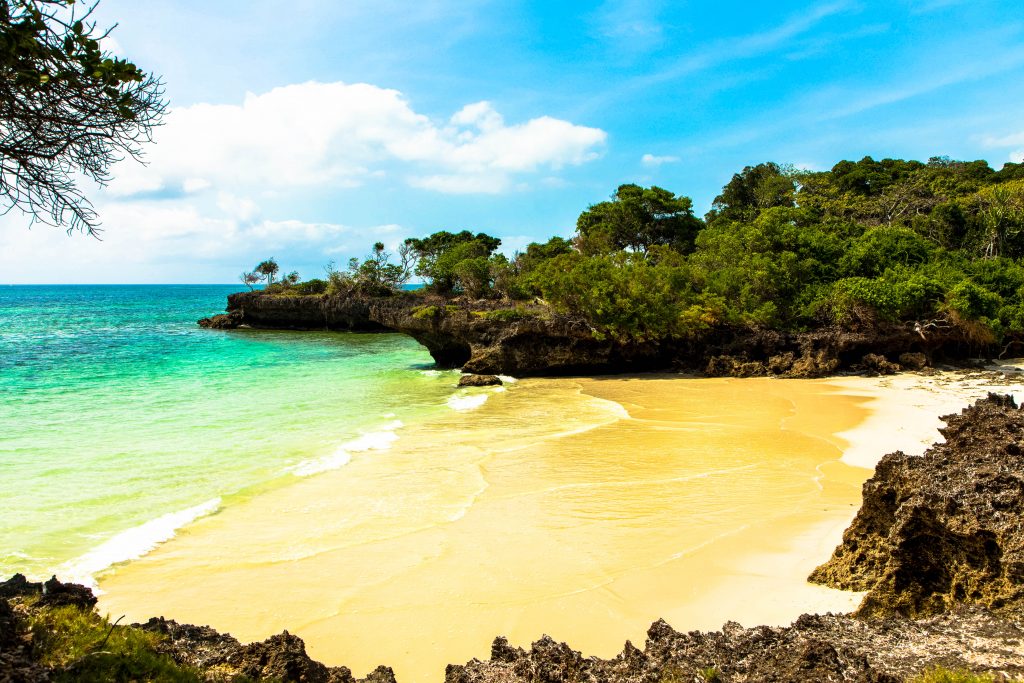
Saltwater Fishing
There’s a reason why anglers fly halfway around the world to fish for big game in Kenya. This part of the Indian Ocean is largely untouched by humans, especially in its deeper regions. This, along with a year-round temperate climate, allowed big, pelagic game species to flourish. Today, Kenya is one of the best deep sea fishing spots on the planet.

What does this mean for you? Just a few miles offshore, you can expect to find exciting species like Giant Trevally, Mahi Mahi, Kingfish, and Barracuda. Places like Malindi are a great starting point for such an adventure, as they hold large numbers of reef fish within a short boat ride from the coast.
For the adventurous, there’s a lot more to experience in these waters. The North Kenya Banks, an undersea mountain chain 55 miles northeast of Malindi, is home to some of the top predators of the ocean. This is one of the rare places on the planet where you can expect to achieve the coveted Fantasy Slam. For the uninitiated, that means catching Blue, Black, and Striped Marlin, as well as Spearfish and Broadbill Swordfish, all in the same day!
Further south along the coastline, Mombasa and Shimoni are two popular departure points for offshore fishermen. The waterbed plummets within just a few miles from these two towns, meaning that you won’t have to spend a lot of time searching for big, hungry fish. The waters off Mombasa will put you on some tasty Wahoo and Yellowfin. Oceanside sunset dinner, anyone? If you’re more into catch and release, the Pemba Channel off Shimoni holds great numbers of Marlin and Sailfish.
Offshore Fishing Seasons in Kenya
Kenya has a fairly stable year-round temperature, especially in its coastal region. The country lies very close to the Equator, so you won’t have the chance to experience a significant temperature drop here. However, the country sees a yearly wet and dry season, and this affects all manner of life, including fish.

The Kenyan wet season is typically from April through June. During this time, saltwater fishing is slow. Come July, however, almost all the species we mentioned come close to shore to feed. Black Marlin, Wahoo, Kingfish, GT and Yellowfins are all on the bite during this period. October through December is reserved for Sailfish, followed by Marlin season from January to March.
If you’re looking for that fantasy slam, know that Broadbill Swordfish start to make an appearance in February, and usually stay in season until the end of March.
The Land
Venturing west and leaving the coast behind, Kenya’s mainland serves an intoxicating dose of lush, green forests, far-reaching lakes, and towering, ice-capped mountain ranges. You could spend days on end in each of these splendid locales. In fact, many anglers do. Let’s take a look at what makes these spots so special.
The Mountains
At the turn of the 19th century, Rainbow and Brown Trout were introduced to many of Kenya’s mountain streams. Ever since then, these tree-lined waterways have hosted countless unforgettable fly angling adventures.
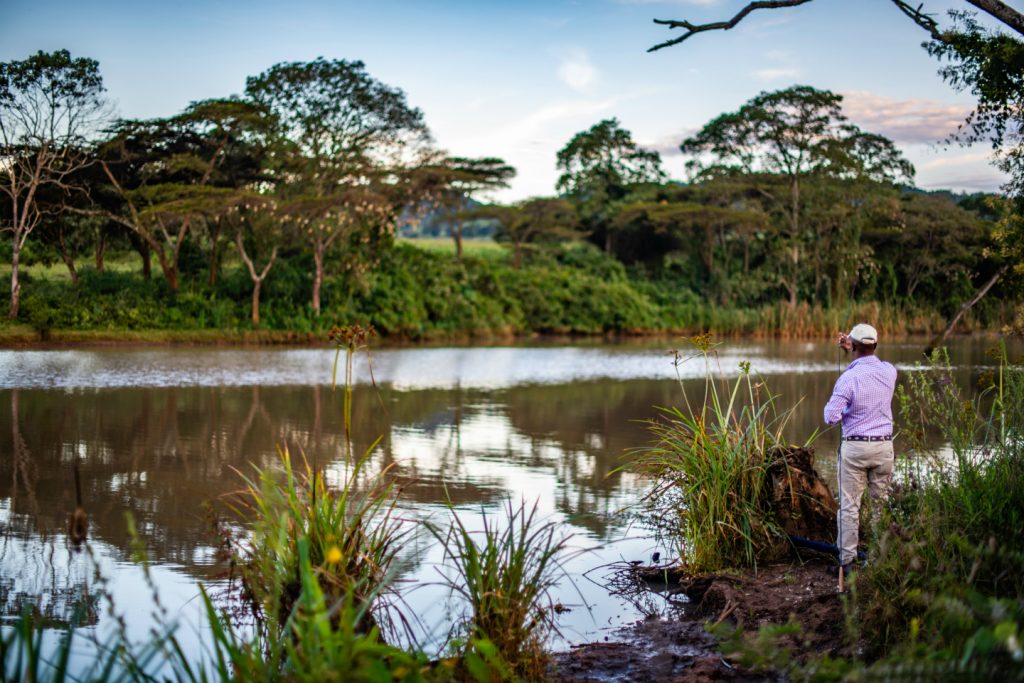
Fly fishing in Kenya had, in fact, become so popular, that a couple of custom, local fly ties trace their origin to these parts. These are the Kenya Bug and the Mrs. Simpson. You can buy both of these patterns at local tackle shops.

As you tread the highland waters, you’ll come across an abundance of wildlife. Critters like monkeys, forest hogs, and bushbuck are likely to cross your path more than once. Be careful, though, as there are buffalos and leopards in these parts too! Hiring a local guide for an outing like this should keep you off of any dangerous trails.

Being so close to the Equator brings its own set of challenges, especially with regards to weather. Here, warm days turn into cold nights in a blink of an eye. Another thing is that the average temperature drops by 6 degrees for every 3,000 feet you climb. Layered clothing is a common cue for fishermen, and it’s particularly important when fishing in the Kenyan mountains.
Mt. Kenya
Mt. Kenya, Africa’s second-highest peak, is one of the most awe-inspiring attractions on the entire continent. Its bare, snow-capped peaks command attention from far away, while its gentle slopes boast thick, green forest.

Breathtaking beauty aside, the mountain offers several amazing spots for Trout fishing. Lakes Alice and Rutundu are two excellent choices for catching Rainbow Trout on the fly. The former is a little harder to reach, as you’ll need to endure a two-hour climb to the 11500 foot-high basin. The effort will be more than worth it, however, as you’ll instantly be greeted by a rewarding view of the nearby peaks, and the vast countryside below.
The Aberdares
The 120-mile ride from Nairobi to Aberdare National Park will take you past wide stretches of banana plantations and expansive rice fields. As the road brings you closer to the park, the vegetation will turn into a lush green forest. The park’s numerous rivers and creeks hold large numbers of Rainbow and Brown Trout, both of which you can catch almost year-round.
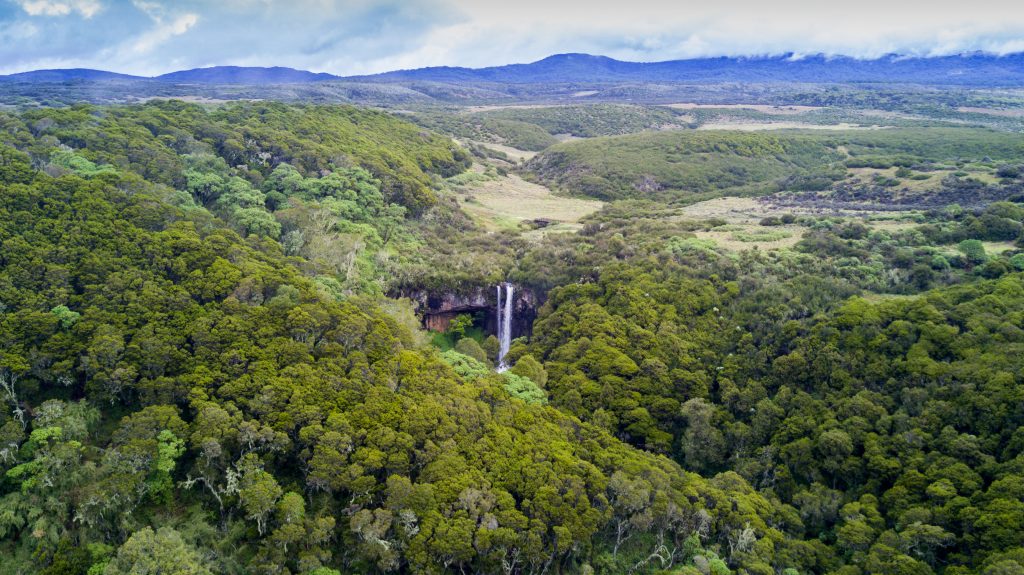
Owing its Trout population to an arduous 7,000-mile boat and ox cart journey, the park was fondly nicknamed “Scotland with lions”.
Nowadays, local guides will gladly take you to one of the three major rivers the park offers: Gura, Chania, and Karuru are all in close vicinity. These jungle-enveloped locales offer a lot more than fishing, mind you. The Aberdares mountain range is dotted with thundering waterfalls, as well as some incredible wildlife. These hills are often visited by various birds, as well as animals like wildebeest, leopards, buffalo, rhinos, and elephants.

At the edge of the park, the famous Treetops Lodge stands as a testament to the long-lasting British influence in the country. The lodge was once a retreat for Queen Elizabeth. According to popular belief, this is the place where the Queen learned of her father’s death, and that she would soon after be assuming the throne. Nowadays, you can make the lodge a base for your Aberdares fishing adventures.
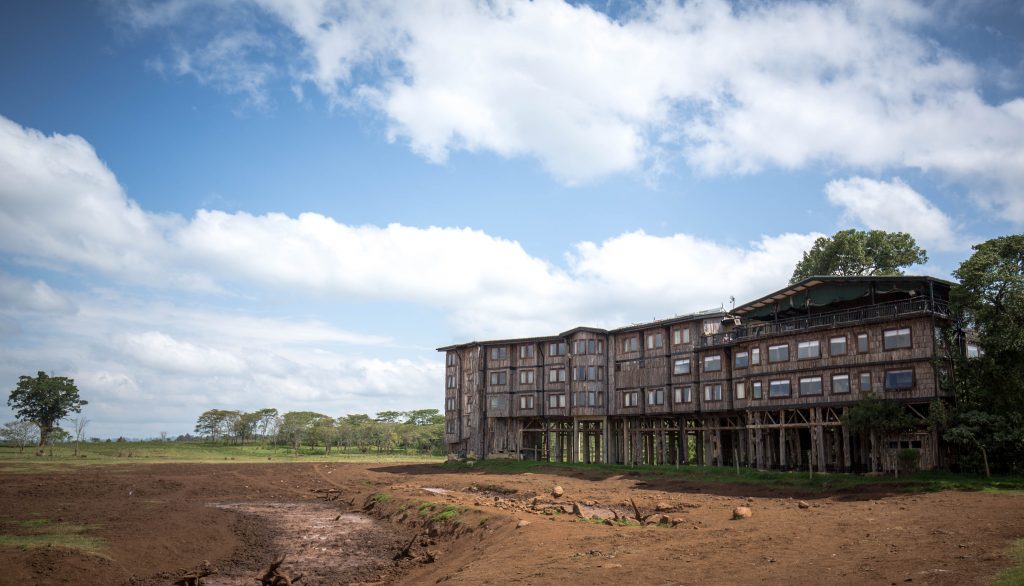
Lake Turkana
Further north, one of Kenya’s most iconic fisheries awaits. A popular choice among adventurists, Lake Turkana lies in the middle of the rugged Kenyan desert. Known as the “Jade Sea,” the lake is a huge body of water, but very secluded, so you’ll need to plan your visit ahead of time. Most anglers choose to fly in from Kitale, a central-Kenya town of some 100,000 inhabitants. You’ll land on an airstrip next to the lakeside village of Lodwar. The village has a few decent accommodation options and serves as a base for lake fishermen.
The journey might be a long one, but it will pay off as soon as you wet your line. In these green waters, you’ll have a field day with Tilapia, Nile Perch, and the imposing Tiger Fish. There’s one thing you’ve got to watch for on Lake Turkana, however, and that’s crocodiles. Like we said, this one’s for adventurists.
Lake Victoria
If you find the Jade Lake a little too remote, you can always choose the well-trodden roads to the west and fish the second largest lake on the planet. Or you can just book a flight from Nairobi to Kisumu. Either way, the expanse that is Lake Victoria is something you’ll surely remember for a long time.

Truth be told, only a small portion of the lake belongs to Kenya, but luckily, the fish don’t know that. Massive Catfish and Nile Perch weighing up to 500 lbs live here! There are also good numbers of Tilapia and Tigerfish, as well.

In the off chance that the fish aren’t biting, a postcard-worthy photo with a hippo or a croc doesn’t sound like a bad consolation prize.
Making it Happen
By now, you’re probably thinking, I’m going to need a longer vacation to experience all of this! And you’re right, Kenya is a vast country, full of hidden gems and astonishing natural beauty. If you’re planning on sticking to the coast, fishing in the ocean, and basking in the sun, things are easy enough. But if you’d like a little more out of your Kenyan adventure, you’re going to need to plan your trips to the mainland well.
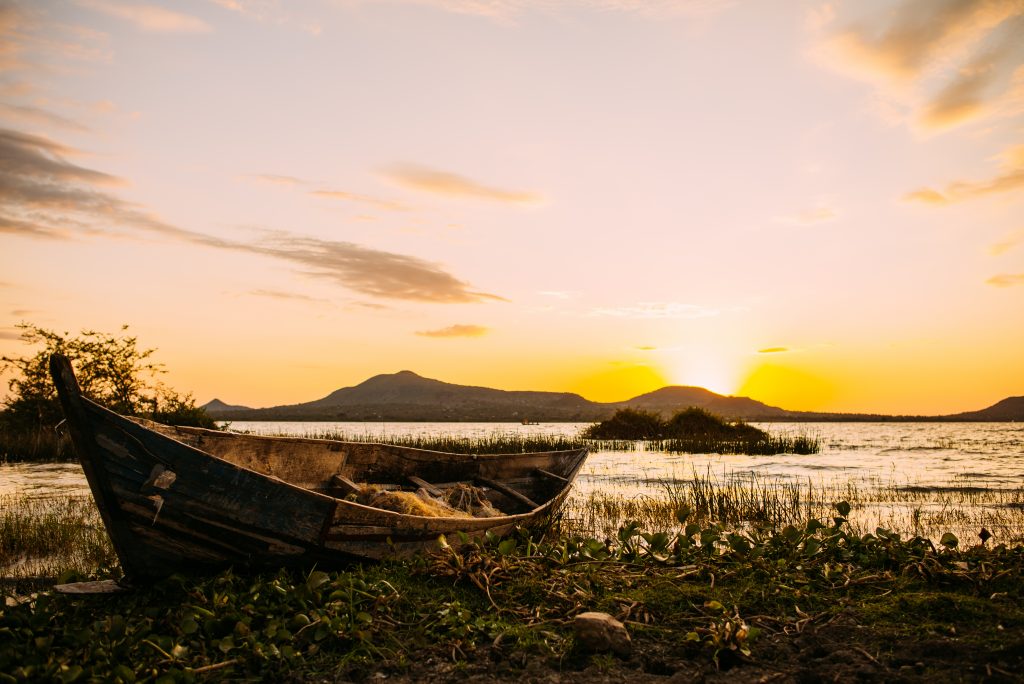
Luckily, major cities like Mombasa and Nairobi offer no shortage of guides that will show you around. There are plenty of fishing-safari combos on offer, many of which can be tailored to your specific needs. One thing’s for sure: the more you stay in Kenya, the more you’ll like it. Just be careful not to stay too long: you wouldn’t be the first one who decided to stay!
What do you think about fishing in Kenya? How does this place compare to some of the better known fisheries of the world? Did you ever fish in Kenya? Let us know in the comments below.